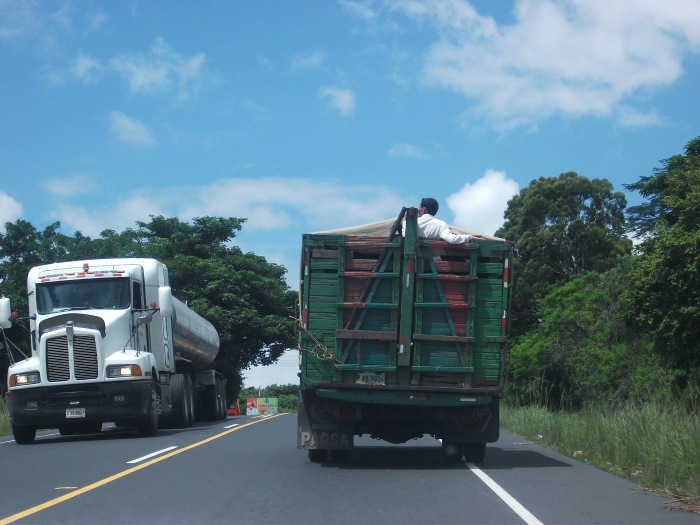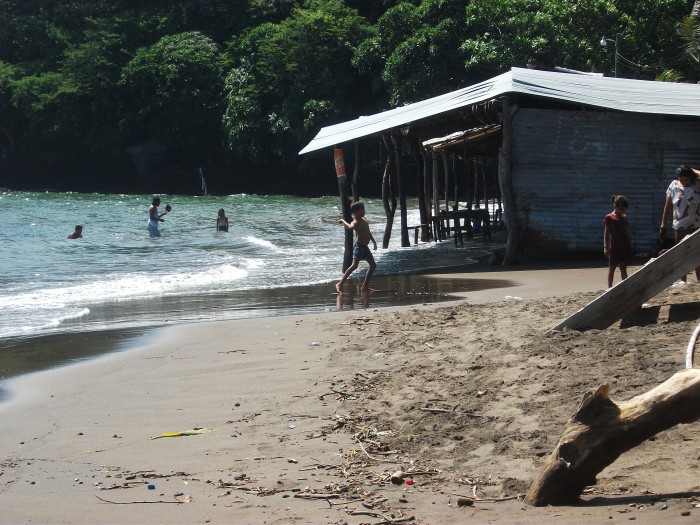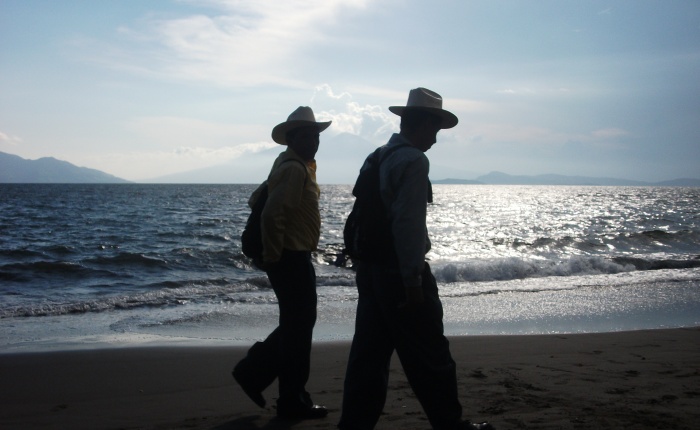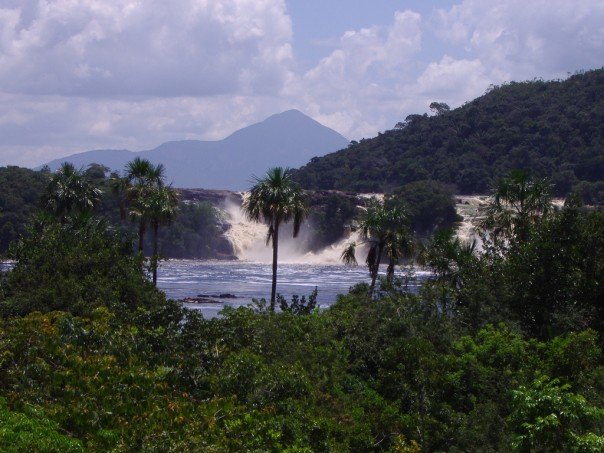The narrow mountain highway has to make way for three cars at times, as we are sporadically over-taken by pick-ups and jeeps managed by drivers with poor judgement of distance and a tearing hurry. It’s easier to understand now why we’d been given so many varying answers as to how long it takes to get from the city to the coast; if you drive at break-neck speed and are unfazed by pulling out and overtaking the space-hogging lorries, holding your breath as you pass the hairpin bends, like thread through a needle, you will certainly arrive quicker.

We take a more gentle pace for most of the route until we get more confident and match some of the Honduran drivers with a few equally reckless manoeuvres. The highway here is always a feast for the eyes, and just looking about you provides constant visual stimulation.
The slow moving truck in front, sagging beneath its heavy load and belching out black smoke, carries more than cargo. There are foot passengers standing close to each other, tightly squeezed and jiggling up and down, with the bumps in the road, wind in their hair. It looks a bit precarious and I fear for their safety as they lurch around a bend, some of them losing their balance.
Vibrant palms and thick forest with varying layers of foliage spill out into the road and tap the glass windscreen as we pass. Well paved asphalt gives way to crumbling terrain with treacherously deep chasms that are more than mere potholes; deep wells that would snap the bottom of your car if you weren’t quick enough to swerve the wheel out of harm’s way. In some parts of the road it’s like traversing the surface of the moon.
Beyond the reckless driving, the slow spluttering trucks and the neglected road surface, you have to pay attention to any other hazard that might unexpectedly cross your path; a chicken, a stray dog, a blindly roaming herd of sleepy cows, donkeys chomping at the grass verges, sheep, pigs, and farmers crossing the road with their ox and cart.
It evokes a deep contrast of feelings in the soul. In the blare and the buzz and frenetic pace of the city, you forget that deep in the lush jungles of Central America, peasants are working the land with beasts and ploughs, as they did centuries before. The simplicity, yet harshness, of the daily grind in the unforgiving steep terrain.
A young boy holds high above his head a metal prong speared with something it takes my mind a while to identify. Fried “lagartos” (lizards) are for sale with spicy jalapeno sauce. A giant yellow butterfly floats past and the sun streaks through the mist in two straight rays that cut through the undergrowth.
 As we deviate from the main road towards Amapala, the mountains fold into flat lands of rice fields and corn plantains. The land is more remote here and I can’t help but notice it’s been quite a while since we’ve seen another car. We gasp as we turn the bend and the ocean glimpses in sight, dotted with green luscious islands and breath-taking dormant volcanoes, covered in dense forest, rising out of the Pacific.
As we deviate from the main road towards Amapala, the mountains fold into flat lands of rice fields and corn plantains. The land is more remote here and I can’t help but notice it’s been quite a while since we’ve seen another car. We gasp as we turn the bend and the ocean glimpses in sight, dotted with green luscious islands and breath-taking dormant volcanoes, covered in dense forest, rising out of the Pacific.
Not exactly sure of where we are going or what we will find when we arrive, we roll into the little village, gateway to isla del tigre and Amapala, where all of a sudden there are clusters of people selling quesadillas, pupusas, soda and cell phone credit; some things have developed in recent years.
A stout lady with a wide nose and thick jaw, and a red tunic covering her clothing runs towards us with surprising speed for her bulk, and signals to us where we can park the car. Not having any better indication, we followed her instructions and left the rental car outside this lady’s mother’s house behind some gating, where “it would be safe” for the night, while we took the boat to the island and found lodging there.
As we stepped out of the car the heat hit us like a slap in the face as she began to explain to us the different options and prices of transport to Amapala and how things worked around here, confiding in us that, if she were in our position, she would go straight to hotel Miramar. She pauses and widens her eyes emphatically, explaining that that way we could save a few lempiras.
Anko asks if she has a cell number we can reach her on, clearly a little apprehensive at leaving the car here. She stops and stares deeply at him until her face breaks into a beaming grin and she lets out a loud cackle, explaining that she has never been allowed to purchase a mobile phone.
Apparently her husband is the jealous type and doesn’t appreciate her receiving calls from random strangers. But, she does give us her name – Delia – and inclines her head towards the old lady with the face full of wrinkles, rocking on the chair outside the house; that is her mother and she never goes anywhere. The car will be safe with them.
Placing all our trust in this jovial lady, we follow her to the dock, where two young boys scamper towards us and offer to take us in their boat. We strike up a deal, far more beneficial to them than us and the little engine chokes into life. We clamber aboard and set forth towards the island, the gentle breeze in our faces providing relief from the constant unrelenting sun. This part of the Pacific is nestled between green and fertile mountain islands and the water in places has the deep florescent color of the jungle reeds.
There are some women washing clothing by the waterside, scrubbing up and down on a steel board with bars of soap, one of them looks up and grins as we pass. Wooden shacks and barren blackened beaches provide a stark contrast to the pristine houses, rising out of sweeping palm forest, fronted by expansive windows, sun glinting on the glass, and private swimming pools at the back. This is a land of cosmic gaps between the rich and the poor, the staggering disparity at times almost absurd.

We ease into the little bay docking at the orange hotel all but hidden by the imposing jungle behind. A dark skinned man with sleepy eyes and a loose ponytail stood in the doorway and with a relaxed smile shouted out “bienvenidos” as he welcomed us inside.
He explained to us the layout of the island, the prices and the (some-what) limited services of the hotel, in a painfully slowly manner that made me want to finish his sentences for him. I ask a question and think he hasn’t heard me, or hasn’t understood, as too many seconds pass before he answers.
The delayed reactions and impossibly slow speech is quite a trait of Amapala, as we discovered. The pace of life is slower; the hot sun obliging you to walk with less haste; the lack of urgency an inbuilt quality.
As we follow him up the steps to the rooms, Anko points out a dead scorpion about 8 inches long on the ground. The dense forest around the hotel seems to hum with insect life and little geckos dance across the ceilings, clicking to each other in their curious song. I close my eyes for a moment. I’m standing on a small piece of earth somewhere in the Pacific Ocean, off the mainland of Central America with barely any civilization around.
The young boy with the lazy eye and even slower speech hangs off the steering wheel, one elbow out the window as he takes us to “playa grande” where we can take a dip, get a beer and nestle our toes between the volcanic sand. Anko asks him what he does for fun and if there are many girls his age on an island such as this. After a painfully slow pause, he lets out an embarrassed laughter, “no” he laments, there are however, lots of “homosexuals”.
I swear I think this was probably the last thing I expected him to say, as we grind over the stony roads, past cheerful, bright yellow three-wheel taxis, a little stone church, a smattering of small stores and sleepy old ladies rocking in their chairs on the streets. I am trying to imagine a love parade procession here and somehow, just can’t.
He lets us out at the beach at one of the rather dilapidated “chiringitos”,(the closest thing to a restaurant here) that line the thin stretch of sand. Tin or straw roofs propped up by wooden poles, with gentle waves lapping at their base.
 We drop down our packs at a plastic table and I jump up to dip my toes into the warm water. I look back at the collection of shaky buildings. As rustic as it may be, “playa grande” is not without its charm. If you can get past the dirty appearance of the water from the black sand and the various unidentified floating objects brushing frequently against your skin. From the water, looking back at the thick jungle jutting into the ocean, I am mesmerized. I do a half-turn towards the horizon; the looming volcano shrouded with cloud at its peak is El Salvador.
We drop down our packs at a plastic table and I jump up to dip my toes into the warm water. I look back at the collection of shaky buildings. As rustic as it may be, “playa grande” is not without its charm. If you can get past the dirty appearance of the water from the black sand and the various unidentified floating objects brushing frequently against your skin. From the water, looking back at the thick jungle jutting into the ocean, I am mesmerized. I do a half-turn towards the horizon; the looming volcano shrouded with cloud at its peak is El Salvador.
We order large plates of fried fish and camerones (shrimp), washed down with cold cerveza and lime, hot sauce and platanos, served with a plastic fork and no knife, making it impossible to eat without having to grab it with our fingers and gnaw the delicious flesh off the bones.
The sand felt good underfoot and the ever-present sun burned through the straw roof. The stress of the week and constant pressure to perform is forgotten for a while as the sounds of the jungle mix with Latin pop beats and the shrieks of giggling children bathing and frolicking in the sea.
A mangy dog lies beneath my feet, scratching its ear with the back of its paw, flicking fleas in my direction. We decide it’s time to get up and move, and walk further along the beach before launching ourselves into the water, just floating for a while, drinking in the scene.
As we get out and walk along the beach, four sting rays are lined up on the sand. Looking back at the water we realize what we’ve been floating next to without realizing. It’s time for another beer and we pull up at a chiringito packed with families. There were people eating, chatting and children playing football, the goal posts delineated with wooden sticks.
 I’m aware of a presence behind me as I turn around to be met with a wide smile and a pair of deep brown eyes. A small boy, Carlitos, lathered in thick sun cream. We become engaged in conversation and he tells me his age (4) and that he prefers swimming to football. I tell him that I come from England, a place far away, and ask him if he knows where it is. He contemplates for a while before nodding his head rapidly and explaining that you have to take a boat to get there.
I’m aware of a presence behind me as I turn around to be met with a wide smile and a pair of deep brown eyes. A small boy, Carlitos, lathered in thick sun cream. We become engaged in conversation and he tells me his age (4) and that he prefers swimming to football. I tell him that I come from England, a place far away, and ask him if he knows where it is. He contemplates for a while before nodding his head rapidly and explaining that you have to take a boat to get there.
We are suddenly joined by his brothers and sisters and cousins, who form an inquisitive group around us. They start to count in English and know some of the months of the year. The little girl, appropriately named Linda, is so beautiful with her soulful eyes and earnest answers , and I wished I could take her with me, and as we left she threw her arms around me, not wanting to let me go.
As we stroll through the town on the way back to the hotel, the cobbled streets were filled with little houses, most of whose inhabitants were outside perched on their chairs, enjoying the evening breeze. Some women were preparing steaming hot tortillas with a variety of fillings in different colored pots on a large wooden table. I stopped in a pulperia to get some water, which is sold her in plastic bags, a cheaper packaging than a bottle . I am not quite sure how to hold it as it slides through my fingers, like a water balloon.
 We hear thunder rumbling ominously in the distance and the storm clouds, jet black against the back drop of the jungle, threaten broodingly, flickering now and then with rays of lightening. We barely make it back before the storm breaks, emptying the sky with a ferocious downpour. We sit and watch as the rain soaks the earth and the violence of the storm in all its glory plays out on front of our eyes. A praying mantis crawls up the wall and the lights flicker with insects. Nature in all its glory and we are in its territory.
We hear thunder rumbling ominously in the distance and the storm clouds, jet black against the back drop of the jungle, threaten broodingly, flickering now and then with rays of lightening. We barely make it back before the storm breaks, emptying the sky with a ferocious downpour. We sit and watch as the rain soaks the earth and the violence of the storm in all its glory plays out on front of our eyes. A praying mantis crawls up the wall and the lights flicker with insects. Nature in all its glory and we are in its territory.
We survive the night and the morning dawns bright and calm and we start off the day with a “plato tipico” which definitely gives a full English breakfast a run for its money. Refried beans with platanos, egg, rice and tortillas certainly sets you up for the day.
The car has been safely protected as promised and as we pull away from the frantically waving and grinning Delia, I feel somehow in some way that I will be back here again one day.










